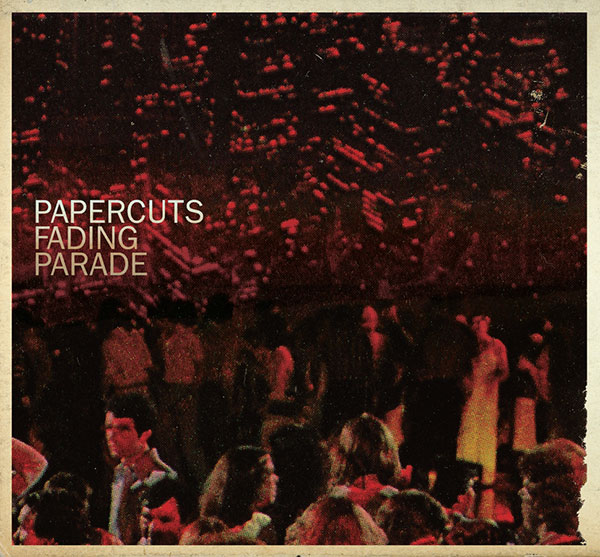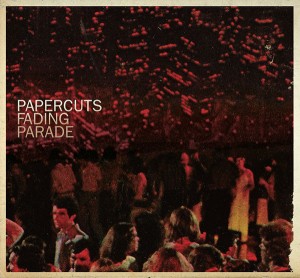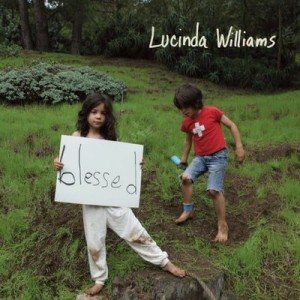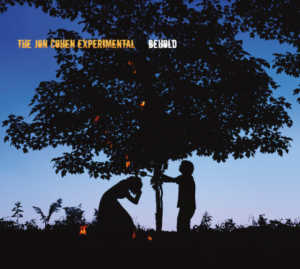Papercuts – Fading Parade
There is nothing particularly bad about Papercuts’ Fading Parade but nothing particularly good, either. The album is mellow to the point of boredom; none of the songs really pop out, and as they’re all quite slow they tend to meld into one never-ending super-track that lulls you into a melancholy stupefaction. Not only are the songs lacking in striking melody or originality, but there is little instrumental color as guitar dominates the entire album. As for the lyrics, if you can understand what the singer is saying, you’re lucky; there is just way too much reverb, to the point where the singer’s voice seems to be coming from a distant sea-cave. Overall, the sound quality of the album makes one wonder if the whole album was recorded in someone’s basement. The album isn’t really awful though, just mediocre and, well, boring. It’s the kind of music you’d want playing quietly in the background when you’re feeling sad, staring out the window at the rain.
– Jennifer Colbourne
Lucinda Williams – Blessed
Featuring Lucinda Williams’ lilting and raspy vocals and contemplative lyricism, Blessed, the tenth release from this seasoned songwriter, is an album you should listen to while drinking whiskey and thinking about sadness. The use of twangy pedal steel guitar infuses the tracks with a comforting country feel, but the gravely intensity of the vocals keeps Blessed from sounding cheesy. Thematically similar to her earlier work, the tracks all speak to experiences that seem personal in their mournful dismissal, including “I Don’t Know How You’re Livin’,” and the slow moving and sad “Sweet Love,” in which Williams uses her voice like an instrument to create an atmosphere, and the lyrics themselves feel almost like an afterthought to the emotion produced by the raw vocalization. With effortless vocal mastery this country blues album is worth a listen or two.
– Sophie Isbister
The Psychic Paramount – II
This album is the third – fourth, if you include live recordings – by Psychic Paramount, an instrumental group reminiscent of bands like Lightning Bolt and Fugazi. While this genre is a fair departure from the top 40, it’s one worth taking: the lack of lyrics make it a great listen for relaxing, homework, or other – ahem – activities that you don’t want to be distracted from. Their music is widely admired by instrumental lovers and rock fans alike; the talent and artistry in the album is plain to even the untrained ear. Their music is sometimes called, aptly enough, “psychedelic rock” – through the use of seemingly random guitar effects and unusual chord groupings, their songs tend to stray just far enough away from the ‘noisey-noise’ variety of rock to remain comfortable. Their first single from the album, “DDB,” is a good choice if you’re looking for an introduction to the genre or the group themselves: the texture of instruments it creates provides a chaotic melody that doesn’t get old even after many consecutive listens. Long and discordant solos make for a continuously interesting listen, even without lyrics.
– Karen Aney
Jon Cohen Experimental – Behold
Behold is the sophomore album by The Jon Cohen Experimental, but its eponymous mastermind is no stranger to making records, cutting his teeth in the vibrant post-millennial Montreal scene with stints in a handful of well-regarded indie bands, including The Dears and The Social Register. Building on the success of their 2006 self-titled debut, Experimental’s latest offering cycles through a broad spectrum of upbeat and baroque yet resiliently soulful pop songs held together by Cohen’s often double-tracked and always soft-spoken vocals. The band works comfortably out of a distinctly Canadian style that wouldn’t feel out of place on Arts & Crafts’ carefully curated roster. Unfortunately, Behold’s generously layered production is stifling and claustrophobic on “Don’t Be The Cloud.” That said, Cohen’s band strikes a perfect balance between these studio flourishes and a sense of spontaneity elsewhere, such as “This Wind of Mine,” channeling the cool, yet playfully manic spirit of Blitzen Trapper.
– Nick Ubels






